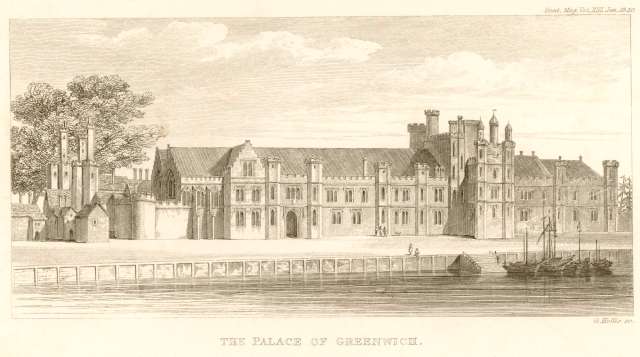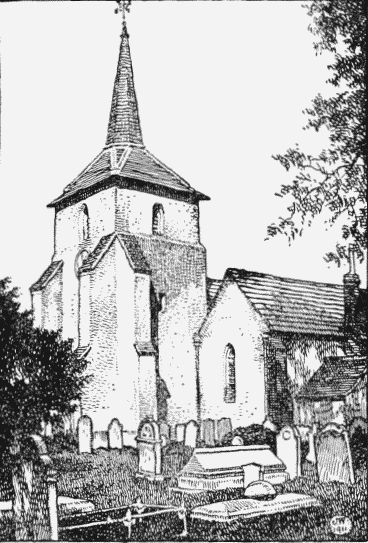Mary Wood
was the grandmother of FRANCIS CLAPHAM of Hunslet (born 1663) and the 7th great-grandmother of ELIZABETH ANN JOHNSON (1875-1948), mother of WILLIAM HENRY FLUEN (1906-1969).
She was christened in Fulbourne co. Cambridgeshire on 01. Feb 1601. She was the daughter of SIR JOHN WOOD, knight of Fulbourne co. Cambridgeshire (1563-1624) and Susan Prettyman of Bacton co. Suffolk (buried at St Peter's, Leeds on 28. Apr 1631), who married at St Vigor's in Fulbourne on 26. Oct 1589.
Notes: According to the 'Visitation of England Volume 5' she was the daughter of William Prettyman and sister of Sir John Prettyman.
 SIR JOHN WOOD was christened at St. Vigor's, Fulbourne on 23. Jun 1563. He was the son of Edward Wood, gent. (1526-1599) and Elizabeth Chicherley (-1608), daughter of Thomas Chicherley of Wimpole co. Cambridgeshire, whose family belonged to the family of Henry Chicheley (1364-1443), Archbishop of Canterbury and founder of All Souls College, Oxford.
SIR JOHN WOOD was christened at St. Vigor's, Fulbourne on 23. Jun 1563. He was the son of Edward Wood, gent. (1526-1599) and Elizabeth Chicherley (-1608), daughter of Thomas Chicherley of Wimpole co. Cambridgeshire, whose family belonged to the family of Henry Chicheley (1364-1443), Archbishop of Canterbury and founder of All Souls College, Oxford.
 NOTE: Photos show Edward and Elizabeth (Chicherley) Wood's chalk tombs at St Vigor's in Fulbourne co. Cambridgeshire. Edward Wood's mother, Elizabeth Clopton, was the grandaughter of JOHN CLOPTON, Esq., Sheriff of Norfolk and Suffolk by his son Edward Clopton of Glemsford co. Suffolk (c. 1454 - c. 1511; will of 10 February 1511 held by The National Archives, Kew PROB 11/16/360).
NOTE: Photos show Edward and Elizabeth (Chicherley) Wood's chalk tombs at St Vigor's in Fulbourne co. Cambridgeshire. Edward Wood's mother, Elizabeth Clopton, was the grandaughter of JOHN CLOPTON, Esq., Sheriff of Norfolk and Suffolk by his son Edward Clopton of Glemsford co. Suffolk (c. 1454 - c. 1511; will of 10 February 1511 held by The National Archives, Kew PROB 11/16/360).
SIR JOHN WOOD became clerk of the council aged 36, and was knighted by James I. at Greenwich Palace (Palace of Placentia), London on 20. May 1603. 1609 he purchased the manor of Beeston and a park of 60 acres with a mine of coal of Captain Ralph Beeston, which went afterwards, by marriage of his daughter, to Thomas Worsley, of whose family it was purchased by Mr. Bland of London. Sir John died 04. February, buried at St Peter's, Leeds on 12. February 1634.

(A sketch of Greenwich Palace in England published in the Gentlemen's Magazine in 1840.)
The Wood family can be traced back to ALEXANDER WOOD of Fulbourne (died 05. Dec 1479), Justice of Peace of Cambridgeshire. Being an unpaid office, undertaken voluntarily and sometimes more for the sake of renown or to confirm the justice's standing within the community, the justice was typically a member of the gentry.
However it is not quite clear, whose son Alexander Wood had been. Some genealogists state that he shall have been born in East Lothian, Scotland belonging to the Clan Wood, others think to know that he was related to the family 'Atte Wode' of Surrey, and would be a descendant of Peter Atte Wood (c. 1325-1382), Justice in Eyre for England, south of the Trent from 1360–1367.
 This Peter Atte Wode was probably born in Coulsdon in Surrey (now Greater London) according to Manning and Bray's 'History of Surrey'. He was the son of Geoffrey Atte Wode (Abt 1297–1346), a Serjeant-at-Arms to Edward III. The Atte Wodes had been in the employ of King Edward III since at least 1341. By 1346 three members of the Atte Wode family were serving in his royal bodyguard as Sergeants-at-Arms, including his father, his uncle Richard Atte Wode, and his grandfather, Sir William Atte Wode (c. bef 1300 - c. 1346), Captain of the King's Guard at the Palace of Westminster. He was the son-in-law of Peter Atte Wode and Alice, who owned both 'Hooley House' and 'Wood Place' in Surrey. The Atte Wode lineage can be traced back to about 1204, when Peter de Wyckhurst purchased 'Hooley House' from the Bertan Marten, the Abbot of Chertsey Abbey. Over the next hundred years, the family added to its land holdings in Surrey and his father, Peter Atte Wode, purchased the 220-acre (0.89 km2) estate known as 'Wood Place' in 1279. The Atte Wodes emerged as one of the new influential class of yeomen, who were becoming substantial land owners in England. In 1318 Sir William and Juliana added to the family's fortune by purchasing another estate known as 'Beckenham' in Kent.
This Peter Atte Wode was probably born in Coulsdon in Surrey (now Greater London) according to Manning and Bray's 'History of Surrey'. He was the son of Geoffrey Atte Wode (Abt 1297–1346), a Serjeant-at-Arms to Edward III. The Atte Wodes had been in the employ of King Edward III since at least 1341. By 1346 three members of the Atte Wode family were serving in his royal bodyguard as Sergeants-at-Arms, including his father, his uncle Richard Atte Wode, and his grandfather, Sir William Atte Wode (c. bef 1300 - c. 1346), Captain of the King's Guard at the Palace of Westminster. He was the son-in-law of Peter Atte Wode and Alice, who owned both 'Hooley House' and 'Wood Place' in Surrey. The Atte Wode lineage can be traced back to about 1204, when Peter de Wyckhurst purchased 'Hooley House' from the Bertan Marten, the Abbot of Chertsey Abbey. Over the next hundred years, the family added to its land holdings in Surrey and his father, Peter Atte Wode, purchased the 220-acre (0.89 km2) estate known as 'Wood Place' in 1279. The Atte Wodes emerged as one of the new influential class of yeomen, who were becoming substantial land owners in England. In 1318 Sir William and Juliana added to the family's fortune by purchasing another estate known as 'Beckenham' in Kent.
Sir William's grandson, Peter Atte Wode, continued to expand both the family’s land holdings and its influence by being appointed a Justice in Eyre; Peter's association with William of Wykeham who became the Bishop of Winchester and the Chancellor of England undoubtedly also helped to increase the family's influence.
(Coulsdon Church from the South-west)
